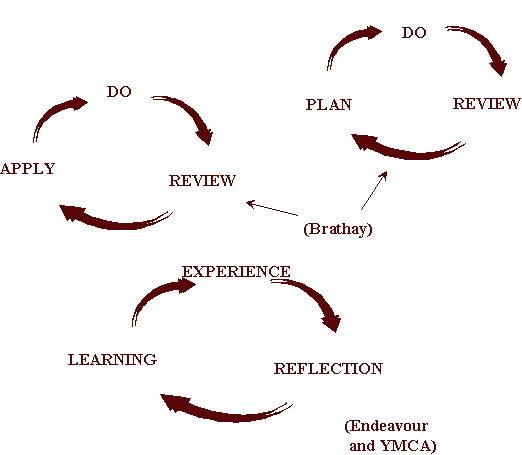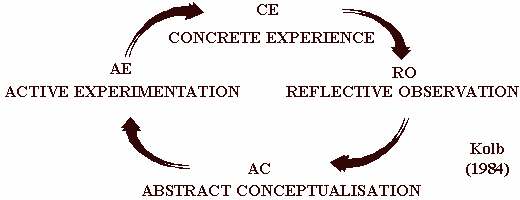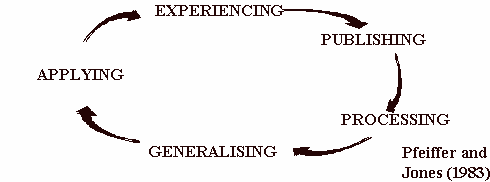HOME
HOME |
HELP |
| Have you ever wondered about the differences between learning cycles, planning cycles, training cycles, development cycles etc. and why there is such a huge selection? This article takes a fresh critical look at cyclical learning models. It is based on an extract from 'Powerful Learning Experiences' (1995) (revised, 2002). See below for more details and useful links. | Index to Experiential Learning pages on this and other sites |
EXPERIENTIAL LEARNING
'Experiential learning' can apply to any kind of learning through experience. 'Experiential learning' is often used by providers of training or education to refer to a structured learning sequence which is guided by a cyclical model of experiential learning. Less contrived forms of experiential learning (including accidental or unintentional learning) are usually described in more everyday language such as 'learning from experience' or 'learning through experience'.
EXPERIENTIAL LEARNING CYCLES
An 'experiential learning cycle' is a means of representing sequences in experiential learning. It is often assumed that the stages of a 'learning cycle' are managed by a facilitator, but they can also be self-managed or even 'unmanaged' in the sense that learning from experience is a normal everyday process for most people. From a trainer's perspective, an experiential learning cycle is a 2, 3, 4 or 5 stage learning sequence which encourages continuity from one experience to another. It is sometimes referred to as a 'training cycle', which can be misleading, especially if the theory underpinning it is about learners and learning (e.g. Dewey, 1938; Kolb, 1984; Juch, 1983.)
The development training process is frequently (but not exclusively) described as a 3-stage learning cycle. For example, brochures of member organisations of the Development Training Advisory Group in the 1980's included these learning cycles:

One or other of the two Brathay cycles were used to explain "The Way We Work" to customers, delegates and to new staff. The theory underlying the models was assumed to be Kolb's theory of experiential learning. (Kolb's model was rarely presented as a model to course delegates because of its wordiness.) The model used by Endeavour and YMCA to describe their way of working uses the same terms as those in Dewey's formula (Dewey, 1938): "Experience plus Reflection equals Learning". Although it is possible to trace the source theories, the interviews with trainers in the previous chapter [of Powerful learning Experiences] have shown that such models are seen only as general guides by trainers, and that trainers will also make use of other models to explain learning processes to course delegates.
However, learning models are meant to be neither schedules for trainers to follow, nor to be malleable visual aids for trainers to use. They are (or belong to) theories about how people learn. My research has enabled me to investigate the ways in which managers' learning experiences correspond to the various learning cycles presented above and below. Some of the learning experiences reported to me by managers might be more accurately represented by a simpler 2-stage model. Some experiences needed more stages of processing than others in order to create recognisable learning or development. Some experiences also required different kinds of processing. My data suggest that it may not always be possible or appropriate to follow a 3-or-more-stage cycle and review every experience to the extent that learning can be identified and 'applied' to the next activity. If learners reflect in some way on their experience, then they can be said (in my usage) to be following an experiential learning cycle - of at least two stages. A 2-stage learning cycle might be:


The concept of a 'cycle' may not readily fit examples of experiential learning in which there is either a significant overlap or a long interval between the 'stages' of a 'cycle'. Despite the existence of examples of experiential learning in this thesis which stretch the concept of a learning 'cycle', I still find the basic concept a useful and versatile one.
Despite the currency of 3 stage learning cycles in development training, it is 4-stage learning cycles that appear to be the basis of most experiential learning theories. Bert Juch (1983: 216) has collected and listed seventeen 4-stage 'learning process cycles' linked to various learning theories, which he has attempted to synthesise by creating one of his own:
(I have turned Juch's presentation of this model through 180o so that 'DOING' appears at the 'top' of the cycle, as in the other models shown.) Kolb's cycle is presented below:

The one 5-stage cycle presented by Juch is the learning sequence described in Kelly's Personal Construct Theory (Kelly, 1955):

I have arranged the above cycle to show how it corresponds to Kolb's four stage experiential learning cycle: four of the five stages correspond to the active part of Kolb's cycle (AE and CE).
A very different 5-stage cycle is favoured by Pfeiffer and Jones (1983) as the sequence to be managed by facilitators of 'structured learning experiences':

I have also arranged this cycle to show how it corresponds to Kolb's four stage experiential learning cycle. In this case, three of the five stages are in the reflective part of Kolb's cycle (RO and AC). Kelly's five stage representation appears to emphasise what leads up to or goes into "experience", and Pfeiffer and Jones' representation appears to emphasise what follows or comes out of "experience".
SOME LIMITATIONS OF LEARNING STYLES AND LEARNING CYCLES
The model which dominates experiential learning theory is a four stage learning cycle, of which there are many versions, the one I have found most frequently quoted being that of Kolb (1984). Closely related to these are theories and models of learning styles (Honey and Mumford, 1982; Juch, 1983; Kolb, 1984). Both kinds of theory are about learning rather than about development. Kolb has himself brought attention to the fact that his 'learning cycle' model and his 'learning styles' model concern learning rather than development. He has another theory about development which he calls "the experiential learning theory of development" (Kolb, 1984: Chapter 6). This theory involves converting his learning cycle model by superimposing a three tier cone on top of the cycle (Kolb, 1984: 141). Kolb also clarifies the limitations of his Learning Style Inventory, pointing out that it only represents "elementary learning orientations" which he sees as being in a different dimension to that of development (Kolb, 1984: 76, 98).
Why is it, then, that courses for personal development, social development, manager development, self development, organisation development etc. are often based on a learning model? Why is it that development training brochures generally show just one model - a cyclical learning model? Is there not a development model that would be more suitable? Would a development model more accurately describe what learners experience on these courses? Would a development model more accurately describe what clients expect from outdoor management development?
Customers and participants are often seeking both learning and development. While experiential learning theories and models help trainers and learners to conceptualise learning, the same theories are not, in my view, well suited for conceptualising development.
Notes, References and Links about Experiential LearningThis page is an extract from Powerful Learning Experiences in Management Learning and Development by Roger Greenaway.I explore the 'learning vs. development' issue more thoroughly in: The Active Reviewing Cycle is my e-learning tutorial illustrating how active and creative reviewing techniques match the stages of this cycle.The article Experiential Learning on the Web by Tim Pickles' is followed by some critiques of Kolb's experiential learning theory from a range of perspectives - together with a link to Kolb's FAQ page about his experiential learning theory and learning styles. Models of Debriefing is an extract from my Chapter on Dynamic Debriefing in Mel Silberman's Handbook of Experiential Learning. Sequencing in Debriefing is another extract from my Chapter on Dynamic Debriefing in Mel Silberman's Handbook of Experiential Learning. Direct links to other sites about experiential learning and learning stylesLearning to Learn a summary of 2 learning cycles (Kolb, Honey and Mumford), descriptions of Honey and Mumford's 4 learning styles, Temporal and Boydell's blockages to learning, and Mumford's list of skills involved in effective learning behaviour.Experiential Learning Cycles by Ed Batista compares (and merges) a few different experiential learning cycles including The Active Reviewing Cycle. Teaching Learners to be Self-Directed by Gerald Grow. This article (originally published in Adult Education Quarterly) presents a model for developing self-directed, lifelong learners. It is based on an adaptation of Situational Leadership to the classroom. Even better is Gerald Grow's In Defense of the Staged Self-Directed Learning Model in which he responds to issues raised by Mark Tennant's critique of his original article. Issues include whether ''mismatches'' of teaching and learning styles should be sought or avoided. Reflecting on Reflective Theories of Reflection is a student blog page from Matt Northam. A refreshing no-nonsense critique of learning styles theory, expressing a preference for models in which the language is provided by people who know you (such as the Johari window), and a distrust of anything that locks you in or oversimplifies. His liking for Jarvis's more complex model is not explained. For a more useful presentation of Jarvis see the excellent infed.org article on experiential learning |
David Kolb's Big BibliographyAlice and David Kolb maintain an extensive bibliography of books and articles about experiential learning theory since 1971 (over 1,500 entries). It is updated twice a year. The latest bibliography is available from www.learningfromexperience.comIndex to some critiques of Kolb's experiential learning theory | Index to Experiential Learning pages on this and other sites |
|
HOME |
HELP |